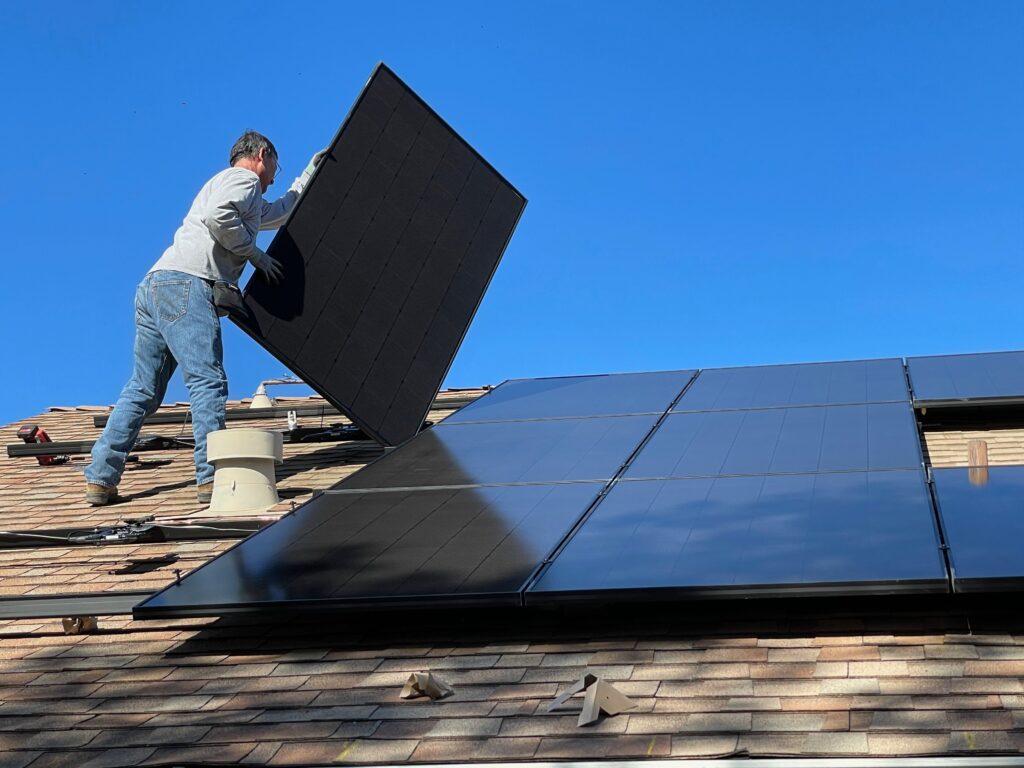Are you eager to harness the power of the sun but daunted by the hefty price tag associated with solar panels? Did you know that, as of 2023, solar panel costs average around $16,000 yet are continually dropping? This blog offers practical advice on procuring affordable solar panels and highlights various financial incentives.
Keep reading to unlock your gateway to sustainable energy!
Key Takeaways
- Solar panel costs vary by state and type, with monocrystalline panels being more expensive but more efficient.
- Local incentives such as tax credits and rebates can significantly reduce the cost of installing solar panels.
- Researching different solar companies is essential to find competitive pricing options.
- Financing options like solar loans or leases can make solar panels more affordable for homeowners.
Factors That Affect Solar Panel Costs
The cost of solar panels varies by state and panel type, with monocrystalline panels typically being more expensive than polycrystalline or thin-film options. The average cost also depends on the size of the solar system and installation costs.
Cost of solar panels by state
Solar panels costs differ from state to state due to factors such as available sunlight, local electricity rates, and solar incentives. For example, in sun-soaked Arizona or California, you would likely pay less for a solar system than in less sunny states like Maine or Alaska.
States with high electricity prices typically see a quicker return on their solar investment compared to states where conventional power is cheaper. Local incentives can greatly reduce the cost of going solar as well; these may include tax credits, rebates, and Solar Renewable Energy Credits (SRECs).
Always research your state’s specific circumstances to understand the true cost of installing a home solar system there.
Cost of solar panels by type (monocrystalline, polycrystalline, thin-film)
Solar panels come in different types, including monocrystalline, polycrystalline, and thin-film options. The cost of these panels can vary depending on the type you choose. Monocrystalline panels generally have higher efficiency and durability but are also more expensive compared to polycrystalline and thin-film panels.
Polycrystalline panels offer a balance between cost and performance, making them a popular choice for many homeowners. Thin-film panels are the most affordable option but may require more space for installation due to their lower efficiency.
When considering the cost of solar panels, it’s important to assess your energy needs and budget to determine which type is best suited for you.
Average cost by panel type
The average cost of solar panels varies depending on the type you choose. Monocrystalline panels, known for their high efficiency, have an average cost ranging from $4,500 to $9,000.
Polycrystalline panels offer a more affordable option with an average cost of $3,800 to $7,200. Thin-film panels are the most budget-friendly choice at around $2,500 to $5,000 on average.
As you consider your options, keep in mind that while monocrystalline panels may be pricier upfront, they can generate more electricity over time and potentially save you more money in the long run.
Average cost by solar system size
Solar system size plays a significant role in determining the average cost of solar panels. The larger the system, the higher the cost will be. On average, smaller residential systems ranging from 5 to 10 kilowatts (kW) can cost between $15,000 to $25,000.
For larger systems between 10 to 20 kW, prices can range from $25,000 to $40,000. It’s important to consider your energy needs and budget when deciding on the size of your solar system.
Solar panel installation costs
Installing solar panels can come with some additional costs. On average, the cost of installing solar panels ranges from $1,000 to $3,000. However, this price can vary depending on factors such as the size of your solar system and any additional equipment needed for installation.
It’s important to factor in these installation costs when considering going solar. But don’t worry! There are ways to make solar panel installation more affordable and accessible.

Ways to Attain Solar Panels at Competitive Rates
Take advantage of local incentives, research solar companies for competitive pricing, and consider financing options such as solar loans or leases.
Take advantage of local incentives
Local incentives can help make solar panels more affordable and accessible. Many cities, states, and even utility companies offer incentives such as rebates, tax credits, or grants to homeowners who install solar power systems.
These incentives can significantly reduce the upfront costs of solar panel installation and make it a more cost-effective option in the long run. By taking advantage of these local incentives, you can not only save money on your initial investment but also contribute to a greener and more sustainable future.
Research solar companies for competitive pricing
Researching solar companies is a crucial step in attaining solar panels at competitive rates. By comparing prices and offers from different companies, you can ensure that you get the best deal possible for your solar panel installation.
Take advantage of online resources and customer reviews to find reputable and reliable solar companies that offer competitive pricing options. Don’t settle for the first company you come across – do your homework and explore all available options to secure affordable solar panels for your home.
Consider financing options such as solar loans or leases
You can explore financing options like solar loans or leases to make solar panels more affordable. Solar loans allow you to borrow money specifically for installing solar panels, and you can repay the loan over time with competitive interest rates and payment flexibility.
Leasing, on the other hand, allows you to rent the solar panel system from a provider, usually with little to no upfront costs. This option may be convenient if you don’t want to take ownership of the equipment.
Both options can help lower your initial investment and make going solar more accessible for homeowners.
Benefits of Solar Panels
Solar panels provide homeowners with lower utility bills, increased home value, and a reduced environmental impact.
Lower utility bills
Installing solar panels can lead to significantly lower utility bills for homeowners. By harnessing the power of the sun, you can generate your own electricity and reduce your reliance on traditional energy sources.
This means that you’ll consume less energy from the grid, resulting in lower monthly utility costs. With solar panels, you have the opportunity to save money on your electric bill while also contributing to a more sustainable future.
Take advantage of this cost-saving benefit and make the switch to solar power today.
Increased home value
Installing solar panels on your home can increase its value significantly. Studies have shown that homes with solar power systems sell for a higher price compared to those without.
According to research, the average increase in home value is around $15,000 when solar panels are installed. This means that not only will you save money on electricity bills and reduce your carbon footprint, but you’ll also be making a smart investment in your property.
So go ahead and embrace the power of the sun – it’s not only good for the environment, but it’s also great for your wallet!
Reduced environmental impact
Solar panels offer a way to reduce our environmental impact by harnessing clean and renewable energy from the sun. By using solar power, we can decrease our reliance on fossil fuels and lower greenhouse gas emissions.
This helps combat climate change and air pollution for a healthier planet. Solar panels produce electricity without emitting harmful pollutants, making them an eco-friendly choice.
Additionally, solar energy is sustainable and abundant, ensuring long-term availability while minimizing strain on natural resources. Investing in solar panels not only benefits your wallet but also contributes to a greener future for all.
Conclusion
In conclusion, achieving sun-powered affordability and attaining solar panels at competitive rates is possible. By taking advantage of local incentives, researching solar companies for competitive pricing, and considering financing options like solar loans or leases, homeowners can access the benefits of solar energy while saving money in the long run.
With lower utility bills, increased home value, and reduced environmental impact, going solar is a smart investment for homeowners looking to embrace clean and affordable renewable technology.
FAQs
1. How can I attain solar panels at competitive rates?
You can attain solar panels at competitive rates by researching and comparing prices from different suppliers, negotiating with installation companies, and taking advantage of any available government incentives or rebates.
2. Are there any financing options available for purchasing solar panels?
Yes, there are various financing options available for purchasing solar panels, such as loans, leases, power purchase agreements (PPAs), or community solar programs. These options allow you to spread out the cost over time or even eliminate upfront expenses.
3. How much money can I save by installing solar panels?
The amount of money you can save by installing solar panels depends on factors such as your energy usage, the size of your system, local electricity rates, and available sunlight. On average, homeowners can save thousands of dollars over the lifetime of their system.
4. Do I need a professional to install my solar panels?
Yes, it is recommended to hire a professional installer for proper installation and to ensure compliance with local building codes and regulations. Professional installers have experience in designing and mounting systems correctly for optimal performance and safety.
Source URLs
https://www.investopedia.com/articles/mortgages-real-estate/10/solar-power-home.asp
https://www.forbes.com/home-improvement/solar/cost-of-solar-panels/
https://us.sunpower.com/solar-resources/pros-and-cons-solar-energy
https://www.iea.org/energy-system/renewables/solar-pv
https://www.energy.gov/eere/solar/equitable-access-solar-energy
https://commission.europa.eu/news/focus-solar-energy-harnessing-power-sun-2022-09-13_en
https://www.marketwatch.com/guides/home-improvement/cheap-solar-panels/








